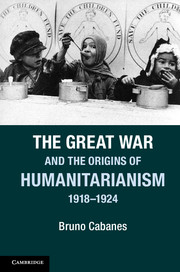Crossref Citations
This Book has been
cited by the following publications. This list is generated based on data provided by Crossref.
Geyer, Michael
2015.
The Emergence of Humanitarian Intervention.
p.
31.
Cameron, Lindsey
2015.
The ICRC in the First World War: Unwavering belief in the power of law?.
International Review of the Red Cross,
Vol. 97,
Issue. 900,
p.
1099.
Småberg, Maria
2015.
On mission in the cosmopolitan world.
Scandinavian Journal of History,
Vol. 40,
Issue. 3,
p.
405.
Laycock, Jo
2015.
Beyond National Narratives? Centenary Histories, the First World War and the Armenian Genocide Armenian Genocide.
Revolutionary Russia,
Vol. 28,
Issue. 2,
p.
93.
Jalagin, Seija
Okkenhaug, Inger Marie
and
Småberg, Maria
2015.
Introduction: Nordic missions, gender and humanitarian practices: from evangelizing to development.
Scandinavian Journal of History,
Vol. 40,
Issue. 3,
p.
285.
Lopez, Patricia J
2015.
Clumsy beginnings: from ‘modernizing mission’ to humanitarianism in the US occupation of Haiti (1915–34).
Environment and Planning A: Economy and Space,
Vol. 47,
Issue. 11,
p.
2240.
Dromi, Shai M.
2016.
Soldiers of the Cross.
Sociological Theory,
Vol. 34,
Issue. 3,
p.
196.
2016.
The Global 1920s.
p.
11.
Taithe, Bertrand
and
Borton, John
2016.
History, memory and ‘lessons learnt’ for humanitarian practitioners.
European Review of History: Revue européenne d'histoire,
Vol. 23,
Issue. 1-2,
p.
210.
Gatrell, Peter
2016.
Refugees—What’s Wrong with History?.
Journal of Refugee Studies,
p.
few013.
TAITHE, BERTRAND
2016.
The Cradle of the New Humanitarian System? International Work and European Volunteers at the Cambodian Border Camps, 1979–1993.
Contemporary European History,
Vol. 25,
Issue. 2,
p.
335.
2016.
Radio and the Politics of Sound in Interwar France, 1921–1939.
p.
64.
O'Sullivan, Kevin
Hilton, Matthew
and
Fiori, Juliano
2016.
Humanitarianisms in context.
European Review of History: Revue européenne d'histoire,
Vol. 23,
Issue. 1-2,
p.
1.
Wieters, Heike
2016.
Reinventing the firm: from post-war relief to international humanitarian agency.
European Review of History: Revue européenne d'histoire,
Vol. 23,
Issue. 1-2,
p.
116.
Kind-Kovács, Friederike
2016.
The Great War, the child’s body and the American Red Cross.
European Review of History: Revue européenne d'histoire,
Vol. 23,
Issue. 1-2,
p.
33.
Grant, Kevin
2017.
Anti‐slavery, refugee relief, and the missionary origins of humanitarian photography ca. 1900–1960.
History Compass,
Vol. 15,
Issue. 5,
Schemper, Lukas
2017.
La prévention des catastrophes naturelles et les organisations internationales du temps de la sdn au lendemain de la guerre froide.
Études internationales,
Vol. 47,
Issue. 1,
p.
29.
Robson, Laura
2017.
REFUGEES AND THE CASE FOR INTERNATIONAL AUTHORITY IN THE MIDDLE EAST: THE LEAGUE OF NATIONS AND THE UNITED NATIONS RELIEF AND WORKS AGENCY FOR PALESTINIAN REFUGEES IN THE NEAR EAST COMPARED.
International Journal of Middle East Studies,
Vol. 49,
Issue. 4,
p.
625.
Moyn, Samuel
2017.
The Law of International Lawyers.
p.
340.
Stråth, Bo
2017.
Identity and social solidarity: an ignored connection. A historical perspective on the state of Europe and its nations.
Nations and Nationalism,
Vol. 23,
Issue. 2,
p.
227.





